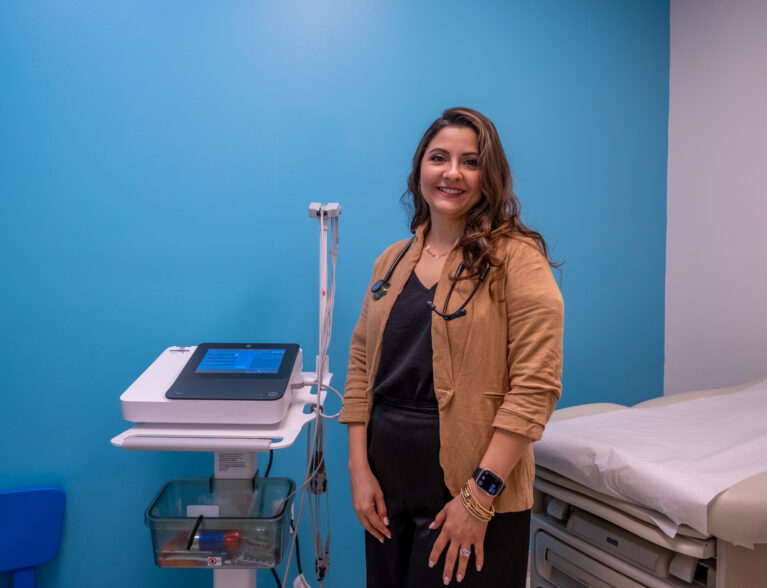
Children in American are not only getting fatter – they are also getting sicker as a direct result.
High blood pressure, or hypertension, in children has been steadily increasing in recent years.
This unfortunate trend is attributed to lifestyle changes, such as playing video games instead of physical games outdoors, obesity and genetic predisposition. The decline in childhood health is a major concern among pediatricians – one that demands immediate attention, early detection and effective management, according to doctors.
If left untreated, hypertension can pose serious health risks, including cardiovascular diseases, kidney damage, reduced quality of life and early death.
“It’s important to know that there are two different types of high blood pressure or hypertension,” said Dr. Vanessa Hormaza, pediatric cardiologist with Nemours Health in Vero Beach. “We have primary hypertension and secondary hypertension. Secondary hypertension is basically more associated with chronic diseases. It’s essentially a side effect of that chronic disease.
“The more prevalent issue is primary hypertension. It’s basically high blood pressure with no other chronic disease associated with it. And it’s mostly secondary to obesity.
“We are seeing a rise in obesity in our adolescents and even younger children. Primary hypertension associated with chronic diseases is what we usually see in children less than 6. If the child is greater than 6, we start thinking of primary hypertension.
“The condition is more common in boys than girls and we see higher rates in Hispanic and non-Hispanic African-American kids in comparison to non-Hispanic white children.”
According to the Centers for Disease Control and Prevention (CDC), the prevalence of obesity among U.S. children and adolescents aged 2-19 has increased dramatically, from 13.9 percent in 1999-2000 to 21.1 percent in 2021-23, and now affects 1 out of every 5 children.
“The earlier you start to develop hypertension, the higher your risk of cardiovascular events are,” Dr. Hormaza continued. “Studies have shown that if you have elevated blood pressure in adolescence you are more likely to have hypertension in young adulthood. That causes vascular changes to blood vessels, like stiffening of the walls, which can lead to higher risk of cardiac events such as heart attacks or even strokes as we get older.”
The National Heart, Lung and Blood Institute warns that high blood pressure in childhood can cause damage to vital organs, as well, including the heart, kidneys and brain. Hypertension can lead to left ventricular hypertrophy, a condition where the heart’s left ventricle thickens, impairing its ability to pump blood efficiently. This increases the risk of heart failure and other cardio complications later in life.
Kidneys can also be harmed by hypertension, potentially leading to chronic kidney disease. The brain is another organ at risk, with hypertension linked to cognitive impairment and increased likelihood of strokes over time.
Then there’s the psychological and social impact of hypertension. Living with a chronic condition can lead to anxiety, depression and decreased self-esteem, especially when accompanied by obesity or other visible health issues. These mental health challenges may hinder a child’s academic performance and social interactions, further diminishing their quality of life.
“Hypertension is a little tricky to diagnose,” Dr. Hormaza said. “Many times, kids are asymptomatic and if for you not measuring it, you may never know. Hypertension is notoriously known as the silent killer because sometimes there are no symptoms at all.
“Some kids do have symptoms such as headaches, visual changes, blurry vision, dizziness, tachycardia and even snoring. If your child is snoring a lot, you might want to get their blood pressure checked.”
The American Academy of Pediatrics recommends that pediatricians begin yearly blood pressure checks beginning with the child’s three-year well child checkup. But knowing the direct correlation with obesity, if your child is obese or even going in for a sick visit, the doctor should be checking the blood pressure too.
Promoting a healthy lifestyle is paramount to preventing childhood hypertension. Parents and caregivers should prioritize a balanced diet rich in fruits, vegetables, whole grains and lean proteins while limiting the intake of processed and high-sodium foods.
Children and teens should be encouraged and given attractive opportunities to participate in as many physical activities as possible, from walking to the corner store instead of getting a ride, to swimming, bike riding, horseback riding, hiking, and participating in individual or team sports. Household activities such as mowing the lawn for older children, gardening, vacuuming or even doing laundry are worthwhile physical activities.
“We know that as your BMI increases, your chance of hypertension increases by two- to three- to four-fold,” Dr. Hormaza said. “Promoting and teaching your children healthy habits can reduce the risk. Make sure they have an active lifestyle. There are reports that indicate that less than half of boys and less than one third of girls actually meet the ideal activity level that they should be doing every day.
“Establishing healthy eating habits with physical activity can help prevent this condition.”
While healthy lifestyle changes are always the first line of treatment for hypertension in children, medical intervention may be necessary if there are already noticeable changes to the heart.
While reluctant to do so, pediatricians may prescribe antihypertensive medications to manage children’s blood pressure levels. However, such treatments should always be paired with ongoing lifestyle modifications to address the root cause of the condition.
Dr. Vanessa Hormaza received her medical degree from University of Texas Medical Branch in Galveston and completed her residency in Pediatrics at USF Health Morsani College of Medicine in Tampa. She went on to complete a fellowship in Pediatric Cardiology at the University of Virginia Health System. Her office is located at Nemours Children’s Health, 1155 35th Lane, Suite 201A, Vero Beach. The phone number is 772-562-5662.



